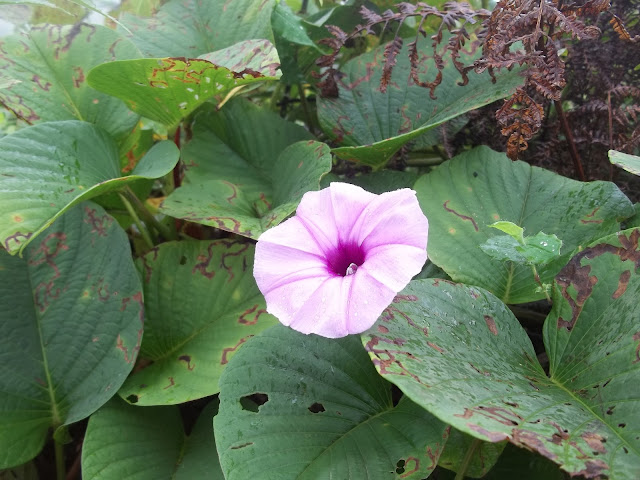Picture yourself at a place where there are rows and rows of
blooming flowers on a flat land, as far as your eyes can see - different
colours, different varieties - surrounded by verdant mountains, lakes and
valleys. If you think I am asking you to recollect a scene from some Yash
Chopra film then you are mistaken. I am alluding to a place which is only 6-7
hours drive South of Mumbai and about 2-3 hours from Pune.
Kaas Plateau, nestled in the Sahyadris (Western Ghats) in
the District of Satara (of Mahabaleshwar fame), is also known as Maharashtra's
Plateau of Flowers or the Valley
of Flowers (being
surrounded by valleys on two sides). As the monsoon sets in, the place comes
alive with millions of wild flowers blooming on the plateau and along the
slopes of the hills (all naturally occurring). The carpet changes colour every
passing day and hour - white, yellow, pink, violet, blue. Add to this the
changing hues of the sky, it being rainy season, and you have a magical place -
a place fit for the Gods!
The best time to enjoy this nature's bounty is August -
October, of which September is perhaps the best. Apart from the flowers, keep
an eye on the fauna as well - birds such as the Malabar Crested Lark, Bonneli's
Eagle, Indian Robin, Crested Bunting, etc; reptiles - we saw a man holding Vine
Snake on our way to the plateau; and myriad insects.
According to Dr. Sandeep Shrotri, there are over 1,500 types
of plants in Kaas - 156 botanical families, 680 genera, 1452 species, 400
medicinal plants, and about 33 endangered varieties in Kaas and the
neighbouring Koyna area. Many of these are believed to be not found elsewhere.
It thus becomes imperative to protect this place. As such the Western Ghats are
a biodiversity hotspot (amongst the two in India, out of a total of 34 world
over). Days after we visited the place, a team from UNESCO visited the site in
order to assess it for declaring it a World Heritage Site. Achieving this
milestone would go a long way in creating awareness about conserving the place.
Some of the commonly found flowers at Kaas, and which are
pictured here & in slideshow are - Mickey Mouse flower,
Senecio Grahami, Utricularia Purpurascens, Dipcadi Montanum, Impatiens
Oppositifolia, Indigofera Dalzelli, Cyanotis Cristata, Ipomoea Nil, Celosia
Argentea, Drosero India, etc. (unable to label them below since it distorts
alignment)
Today, this once quaint idyllic place is under threat (it is
not a declared protected area!) as lakhs of tourists visit this place. While
tourism helps create awareness, it is also a double edged sword. Many tourists
blissfully pluck flowers, uproot plants, litter the place and trample upon the
flowers & insects - not knowing which endangered species they might be
causing harm to. Many also indulge in revelry and treat it as a picnic spot.
When we reached the spot on the first day, there were
hundreds of vehicles lined-up on either side of the road along the Kaas Plateau
- while the next day (being Sunday) there was absolutely no place to park for
miles - the cops had decided to halt vehicles headed for Kaas well in advance
in order to avoid a traffic nightmare. I have to say that the cops stationed at
the place are doing an admirable job of guiding the tourists and preventing any
foul play - but just like entries to a national park are restricted, to
conserve the place it is necessary to quickly come up with some mechanism to
manage the flow of tourists.
With the place gaining in popularity over the last few
years, things have only gotten worse. What's more, the place is also rich in
minerals and one can only dread what could be the fate of the place if it is
not declared a protected area!
Even the drive from Satara City
to Kaas Plateau (about 20-22 Kms) is very scenic. One can see the Kanher Dam
and Urmodi Dam on either side of the drive respectively - separated from the
road by scenic valleys. There are number of farms dotting the place where one
can see people going about their simple yet strenuous routines. After visiting
Kaas, one can spend a good hour or two photographing the panoramic landscape,
birds and other flora around here. Then there is also the Kaas Lake
which is a must visit - its azure waters surrounded by forests,and the cool
wind blowing on your face provide a nice tranquil and refreshing feeling. Apart
from this, I have been told, there are a number of historical temples and
gushing waterfalls nearby.
Soak it in!
Most importantly do not miss the evening at Kaas Plateau -
the sunset and the changing hues of the sky are absolutely surreal and have an
out of the world feeling about it.
We ended our trip on Sunday afternoon by enjoying sumptuous
Maharashtrian food at a place providing homestay options - located between Satara City
and Kaas. These people were very passionate about nature and had planted a
number of flowering plants in their courtyard. The flowers you will see towards
the end of the slideshow are the ones cultivated by these folks and are not to
be mistaken for the wild flowers of Kaas Plateau.



















































































No comments:
Post a Comment